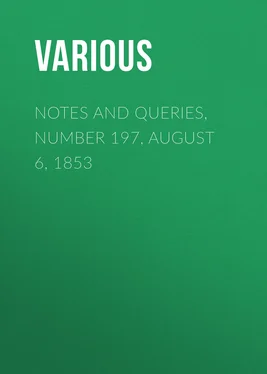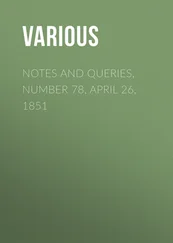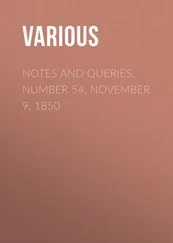Various - Notes and Queries, Number 197, August 6, 1853
Здесь есть возможность читать онлайн «Various - Notes and Queries, Number 197, August 6, 1853» — ознакомительный отрывок электронной книги совершенно бесплатно, а после прочтения отрывка купить полную версию. В некоторых случаях можно слушать аудио, скачать через торрент в формате fb2 и присутствует краткое содержание. Жанр: foreign_antique, periodic, foreign_edu, на английском языке. Описание произведения, (предисловие) а так же отзывы посетителей доступны на портале библиотеки ЛибКат.
- Название:Notes and Queries, Number 197, August 6, 1853
- Автор:
- Жанр:
- Год:неизвестен
- ISBN:нет данных
- Рейтинг книги:4 / 5. Голосов: 1
-
Избранное:Добавить в избранное
- Отзывы:
-
Ваша оценка:
- 80
- 1
- 2
- 3
- 4
- 5
Notes and Queries, Number 197, August 6, 1853: краткое содержание, описание и аннотация
Предлагаем к чтению аннотацию, описание, краткое содержание или предисловие (зависит от того, что написал сам автор книги «Notes and Queries, Number 197, August 6, 1853»). Если вы не нашли необходимую информацию о книге — напишите в комментариях, мы постараемся отыскать её.
Notes and Queries, Number 197, August 6, 1853 — читать онлайн ознакомительный отрывок
Ниже представлен текст книги, разбитый по страницам. Система сохранения места последней прочитанной страницы, позволяет с удобством читать онлайн бесплатно книгу «Notes and Queries, Number 197, August 6, 1853», без необходимости каждый раз заново искать на чём Вы остановились. Поставьте закладку, и сможете в любой момент перейти на страницу, на которой закончили чтение.
Интервал:
Закладка:
Various
Notes and Queries, Number 197, August 6, 1853 / A Medium of Inter-communication for Literary Men, Artists, Antiquaries, Genealogists, etc
Notes
HIGH CHURCH AND LOW CHURCH
A Universal History of Party; with the Origin of Party Names 1 1 There is a book called History of Party, from the Rise of the Whig and Tory Factions Chas. II. to the Passing of the Reform Bill , by G. W. Cooke: Lond. 1836-37, 3 vols. 8vo.; but, as the title shows, it is limited in scope.
would form an acceptable addition to literary history: "N. & Q." has contributed towards such a work some disquisitions on our party names Whig and Tory , and The Good Old Cause . Such names as Puritan , Malignant , Evangelical 2 2 See Haweis's Sermons on Evangelical Principles and Practice : Lond. 1763, 8vo.; The True Churchmen ascertained; or, An Apology for those of the Regular Clergy of the Establishment, who are sometimes called Evangelical Ministers: occasioned by the Publications of Drs. Paley, Hey, Croft; Messrs. Daubeny, Ludlam, Polwhele, Fellowes; the Reviewers, &c. : by John Overton, A. B., York, 1802, 8vo., 2nd edit. See also the various memoirs of Whitfield, Wesley, &c.; and Sir J. Stephens Essays on "The Clapham Sect" and "The Evangelical Succession."
, can be traced up to their first commencement, but some obscurity hangs on the mintage-date of the names we are about to consider.
As a matter of fact, the distinction of High Church and Low Church always existed in the Reformed English Church, and the history of these parties would be her history. But the names were not coined till the close of the seventeenth century, and were not stamped in full relief as party-names till the first year of Queen Anne's reign.
In October, 1702, Anne's first Parliament and Convocation assembled:
"From the deputies in Convocation at this period, the appellations High Church and Low Church originated, and they were afterwards used to distinguish the clergy. It is singular that the bishops 3 3 It is not so very "singular," when we remember that the bishops were what Lord Campbell and Mr. Macauley call " judiciously chosen" by William. On this point a cotemporary remarks, "Some steps have been made, and large ones too, towards a Scotch reformation, by suspending and ejecting the chief and most zealous of our bishops, and others of the higher clergy; and by advancing, upon all vacancies of sees and dignities, ecclesiastical men of notoriously Presbyterian, or, which is worse, of Erastian principles . These are the ministerial ways of undermining Episcopacy; and when to the seven notorious ones shall be added more, upon the approaching deprivation, they will make a majority; and then we may expect the new model of a church to be perfected." (Somers' Tracts , vol. x. p. 368.) Until Atterbury, there were few High Church Bishops in Queen Anne's reign in 1710. Burnet singles out the Bishop of Chester: "for he seemed resolved to distinguish himself as a zealot for that which is called High Church ."— Hist. Own Time , vol. iv. p. 260.
were ranked among the Low Churchmen (see Burnet, v. 138.; Calamy, i. 643.; Tindal's Cont. , iv. 591.)"—Lathbury's Hist. of the Convocation , Lond. 1842, p. 319.
Mr. Lathbury is a very respectable authority in matters of this kind, but if he use "originated" in its strict sense, I am inclined to think he is mistaken; as I am tolerably certain that I have met with the words several years before 1702. At the moment, however, I cannot lay my hands on a passage to support this assertion.
The disputes in Convocation gave rise to a number of pamphlets, such as A Caveat against High Church , Lond. 1702, and The Low Churchmen vindicated from the unjust Imputation of being No Churchmen, in Answer to a Pamphlet called "The Distinction of High and Low Church considered: " Lond. 1706, 8vo. Dr. Sacheverell's trial gave additional zest to the dudgeon ecclesiastick , and produced a shower of pamphlets. I give the title of one of them: Pulpit War, or Dr. S–l, the High Church Trumpet, and Mr. H–ly, the Low Church Drum, engaged by way of Dialogue , Lond. 1710, 8vo.
To understand the cause of the exceeding bitterness and virulence which animated the parties denominated High Church and Low Church , we must remember that until the time of William of Orange, the Church of England, as a body —her sovereigns and bishops, her clergy and laity—comes under the former designation; while those who sympathised with the Dissenters were comparatively few and weak. As soon as William was head of the Church, he opened the floodgates of Puritanism, and admitted into the church what previously had been more or less external to it. This element, thus made part and parcel of the Anglican Church, was denominated Low Church . William supplanted the bishops and clergy who refused to take oaths of allegiance to him as king de jure ; and by putting Puritans in their place, made the latter the dominant party. Add to this the feelings of exasperation produced by the murder of Charles I., and the expulsion of the Stuarts, and we have sufficient grounds, political and religious, for an irreconcilable feud. Add, again, the reaction resulting from the overthrow of the tyrannous hot-bed and forcing-system, where a sham conformity was maintained by coercion; and the Church-Papist , as well as the Church-Puritans , with ill-concealed hankering after the mass and the preaching-house, by penal statutes were forced to do what their souls abhorred, and play the painful farce of attending the services of "The Establishment."
A writer in a High Church periodical of 1717 (prefacing his article with the passage from Proverbs vi. 27.) proceeds:
"The old way of attacking the Church of England was by mobs and bullies, and hard sounds; by calling Whore , and Babylon , upon our worship and liturgy, and kicking out our clergy as dumb dogs : but now they have other irons in the fire; a new engine is set up under the cloak and disguise of temper, unity, comprehension, and the Protestant religion . Their business now is not to storm the Church, but to lull it to sleep : to make us relax our care, quit our defences, and neglect our safety.... These are the politics of their Popish fathers: when they had tried all other artifices, they at last resolved to sow schism and division in the Church: and from thence sprang up this very generation, who by a fine stratagem endeavoured to set us one against the other, and they gather up the stakes. Hence the distinction of High and Low Church. "— The Scourge , p. 251.
In another periodical of the same date, in the Dedication "To the most famous University of Oxford," the writer says:
"These enemies of our religious and civil establishment have represented you as instillers of slavish doctrines and principles … if to give to God and Cæsar his due be such tow'ring, and High Church principles, I am sure St. Peter and St. Paul will scarce escape being censured for Tories and Highflyers ."— The Entertainer , Lond. 1717.
"If those who have kept their first love, and whose robes have not been defiled, endeavour to stop these innovations and corruptions that their enemies would introduce, they are blackened for High Church Papists , favourers of I know not who, and fall under the public resentment."— Ib. p. 301.
I shall now give a few extracts from Low Church writers (quoted in The Scourge ), who thus designate their opponents:
Читать дальшеИнтервал:
Закладка:
Похожие книги на «Notes and Queries, Number 197, August 6, 1853»
Представляем Вашему вниманию похожие книги на «Notes and Queries, Number 197, August 6, 1853» списком для выбора. Мы отобрали схожую по названию и смыслу литературу в надежде предоставить читателям больше вариантов отыскать новые, интересные, ещё непрочитанные произведения.
Обсуждение, отзывы о книге «Notes and Queries, Number 197, August 6, 1853» и просто собственные мнения читателей. Оставьте ваши комментарии, напишите, что Вы думаете о произведении, его смысле или главных героях. Укажите что конкретно понравилось, а что нет, и почему Вы так считаете.












